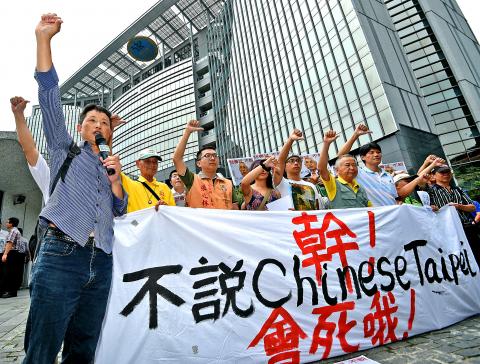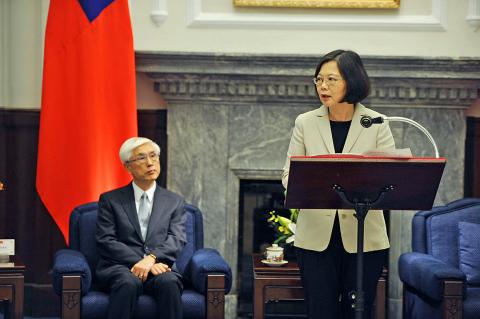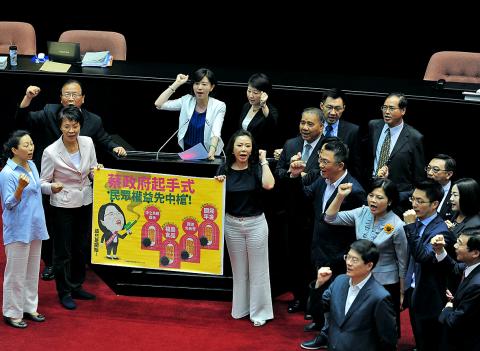Minister of Health and Welfare Lin Tzou-yien (林奏延) yesterday said the speech he delivered at the World Health Assembly (WHA) — which sparked controversy because it did not mention “Taiwan” — was “discussed as a team” and had an “adjusted impromptu section based on what happened at the assembly.”
Lin returned to Taiwan from Geneva, Switzerland, yesterday and visited President Tsai Ing-wen (蔡英文) and Premier Lin Chuan (林全) before speaking at a news conference at the Executive Yuan.
Lin Tzou-yien said Tsai considered the delegation to have completed its mission and she agreed that medical diplomacy is vital for the nation and would continue to be pushed by the ministry, the National Security Council and the Ministry of Foreign Affairs.

Photo: Fang Pin-chao, Taipei Times
“No one should be left behind” was the crucial theme of the WHA this year, which “reflects the necessity of our participation. Taiwan must never be absent from the global medical system,” Tsai said.
Executive Yuan spokesperson Tung Chen-yuan (童振源) said the premier expressed approval for the minister’s accomplishments at the WHA and agreed to provide assistance to the health ministry’s plan to participate in upcoming WHO activities.
Lin Tzou-yien told the news conference that he upheld “the nation’s greatest interests” as the delegation’s strategic goal at the WHA.

Photo CNA
“We had a total of 45 bilateral meetings with the delegations from other countries such as the US, Japan and EU members,” he said.
When asked whether the Presidential Office had previewed a draft of his speech, Lin Tzou-yien said the speech was drawn up “as a team” and was based on “the principles of professionalism and practicality, and the determination to make a contribution.”
He denied that national security agencies had “issued directives” concerning the content of the speech, adding that it had been drafted “together by those on the front lines and those in the rear offering support.”

Photo: Wang Yi-sung, Taipei Times
The reason that “Taiwan” was not mentioned in the speech was because “Chinese Taipei” is the name the nation is registered as with the WHA, Lin Tzou-yien said.
Asked whether it is the name to be used internationally from now on, Vice Minister of Foreign Affairs Leo Lee (李澄然) said that “Chinese Taipei” is used depending on how Taiwan has negotiated with international organizations.
“There are organizations with which we are registered as ‘Taiwan,’ but with the WHA, it is ‘Chinese Taipei,’ which is unsatisfactory, but acceptable,” Lee said.
“We have handed a protest letter to the WHO’s legal counsel, who agreed to transfer the letter to WHO Director-General Margaret Chan (陳馮富珍),” Lin Tzou-yien said. “In the letter we said that we do not accept any political framework and express our ‘stern protest’ over the fact that our invitation was delayed.”
“I know a lot of people are not pleased with the name we used and I empathize with their feelings of injustice, but that could motivate us to improve,” he said. “Our ability to make contributions to global health would provide us confidence and dignity when participating” in the WHA.
The minister said that Taiwan held four training workshops in the Asia-Pacific region in the past year, aiming to help neighboring countries bolster their defenses against the Ebola, Middle East respiratory syndrome, dengue and Zika viruses.
“In the WHA speech, I proposed to respond to the ‘global surgery’ initiative that has been launched and discussed globally in recent years by offering 50 of our surgeons whose expertise is internationally recognized to participate in the program,” Lin Tzou-yien said.
“A WHO advisory board, including specialists from academia, will also be established, as the participation is not a one-day matter, but for a whole year, and the counsel will be assisting in preparations for the meetings,” he added.
When asked about interactions with the Chinese delegation, he said there was no official meeting with China, but he had shaken hands with Chinese Minister of Health Li Bin (李斌) and proposed to “continue to cooperate with each other.”
The “concrete gains” from the WHA participation included that during bilateral talks with the US delegation, the two sides agreed that the US would send specialists in dengue vaccine, who have been focusing on vaccines for children and young people, to Taiwan next month to help with a clinical trial for elderly people, who in Taiwan are more susceptible to dengue fever.
Separately yesterday, the Chinese Nationalist Party (KMT) caucus obstructed legislative proceedings in the afternoon, demanding that Legislative Speaker Su Jia-chyuan (蘇嘉全) process the caucus’ proposed resolution on castigating the premier and the health minister over “wimpiness” in not using the name Taiwan in the speech.
The KMT also demanded that the officials apologize to the public.
Su called for a break and the KMT lawmakers announced the resolution on their own, before calling Su a “runaway speaker.”
Su returned about 30 minutes later and announced that the handling of the resolution was not be in line with legislative regulations.
The KMT called for a vote, but with only 29 KMT lawmakers in the general assembly chamber, the proposal was terminated as a quorum was not met.
Additional reporting by CNA

DEFENDING DEMOCRACY: Taiwan shares the same values as those that fought in WWII, and nations must unite to halt the expansion of a new authoritarian bloc, Lai said The government yesterday held a commemoration ceremony for Victory in Europe (V-E) Day, joining the rest of the world for the first time to mark the anniversary of the end of World War II in Europe. Taiwan honoring V-E Day signifies “our growing connections with the international community,” President William Lai (賴清德) said at a reception in Taipei on the 80th anniversary of V-E Day. One of the major lessons of World War II is that “authoritarianism and aggression lead only to slaughter, tragedy and greater inequality,” Lai said. Even more importantly, the war also taught people that “those who cherish peace cannot

STEADFAST FRIEND: The bills encourage increased Taiwan-US engagement and address China’s distortion of UN Resolution 2758 to isolate Taiwan internationally The Presidential Office yesterday thanked the US House of Representatives for unanimously passing two Taiwan-related bills highlighting its solid support for Taiwan’s democracy and global participation, and for deepening bilateral relations. One of the bills, the Taiwan Assurance Implementation Act, requires the US Department of State to periodically review its guidelines for engagement with Taiwan, and report to the US Congress on the guidelines and plans to lift self-imposed limitations on US-Taiwan engagement. The other bill is the Taiwan International Solidarity Act, which clarifies that UN Resolution 2758 does not address the issue of the representation of Taiwan or its people in

US Indo-Pacific Commander Admiral Samuel Paparo on Friday expressed concern over the rate at which China is diversifying its military exercises, the Financial Times (FT) reported on Saturday. “The rates of change on the depth and breadth of their exercises is the one non-linear effect that I’ve seen in the last year that wakes me up at night or keeps me up at night,” Paparo was quoted by FT as saying while attending the annual Sedona Forum at the McCain Institute in Arizona. Paparo also expressed concern over the speed with which China was expanding its military. While the US

‘FALLACY’: Xi’s assertions that Taiwan was given to the PRC after WWII confused right and wrong, and were contrary to the facts, the Ministry of Foreign Affairs said The Ministry of Foreign Affairs yesterday called Chinese President Xi Jinping’s (習近平) claim that China historically has sovereignty over Taiwan “deceptive” and “contrary to the facts.” In an article published on Wednesday in the Russian state-run Rossiyskaya Gazeta, Xi said that this year not only marks 80 years since the end of World War II and the founding of the UN, but also “Taiwan’s restoration to China.” “A series of instruments with legal effect under international law, including the Cairo Declaration and the Potsdam Declaration have affirmed China’s sovereignty over Taiwan,” Xi wrote. “The historical and legal fact” of these documents, as well